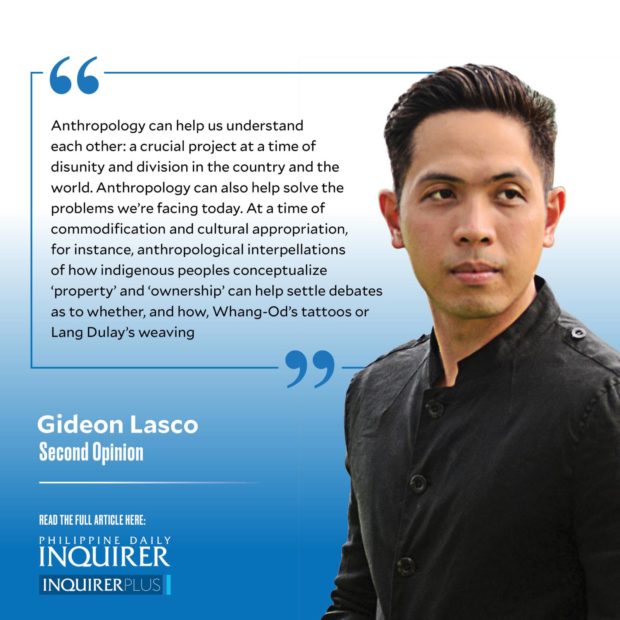Why our country needs more anthropologists
 Whenever I tell people that I’m an anthropologist, I get interesting questions, like “do you study fossils?” (Not really—you’re referring to paleontologists); “do you study artifacts and bones?’’ (You’re referring to archeologists and physical anthropologists—two subfields of anthropology—but the rest of us study living humans); or “which tribe do you study?” (Humanity!).
Whenever I tell people that I’m an anthropologist, I get interesting questions, like “do you study fossils?” (Not really—you’re referring to paleontologists); “do you study artifacts and bones?’’ (You’re referring to archeologists and physical anthropologists—two subfields of anthropology—but the rest of us study living humans); or “which tribe do you study?” (Humanity!).
I explain to them that anthropology is simply the study of what makes us human—our practices, traditions, languages, values, relationships, the environments we have co-constructed with the rest of nature, all of which constitute “culture.”
I go on to tell them that the association of anthropologists with “tribe” and “going native” is part of the colonial roots of the discipline, but anthropologists have since diversified to tackle contemporary issues, from farming and fashion to overseas work to online gaming. Some anthropologists continue to study indigenous people, no longer with a view that they are “primitive” but with the recognition of their own sophistication and dignity. Personally, I study contemporary health issues, from drug use to immunization programs, bringing in the same “cultural relativism” to my work.
Finally, just to clear their confusion, I clarify that anthropology is similar to sociology, but we have separate histories, areas of interest, and methodological emphasis: We’re more associated with longer-term ethnographic fieldwork while sociologists tend to employ more quantitative alongside qualitative methods. By “fieldwork,” I mean living with, hanging out, participating in everyday activities with people we’re interested in learning from; we anthropologists think that what people say can be different from what they actually do, which is why we believe in the value of ethnography.
Anthropology can help us understand each other: a crucial project at a time of disunity and division in the country and the world. For instance, in my urban anthropology class, we discussed the amount of time and effort it takes for urban poor communities to access water in the city (e.g. queuing for pails of water and paying for it); I also shared my research about shabu, where I found that young people use it as pampagilas (energy booster) in their various income opportunities. By according complexity to people’s lived experiences, anthropology can lead to empathy and solidarity, instead of judgment and prejudice.
Anthropology can also help solve the problems we’re facing today. At a time of commodification and cultural appropriation, for instance, anthropological interpellations of how indigenous peoples conceptualize “property” and “ownership” can help settle debates as to whether, and how, Whang-Od’s tattoos or Lang Dulay’s weaving designs can be used by others, just as anthropological engagements with communities can clarify the full impacts of destructive projects like the Kaliwa Dam and Tampakan. Moreover, anthropological accounts of people’s medical knowledge and practice can help us respond to public health problems like malaria, HIV, and COVID-19. In my ongoing research with Prof. Michael Tan, we have been documenting how notions of “hawa,” “resistensiya,” “loob,” and “labas” have shaped our pandemic response.
At a personal level, meanwhile, anthropology both draws from, and builds on, my sense of wonder for the world—and my commitment to social justice. My love for learning about different places—whether through reading or traveling—has driven me to pursue anthropology, but in turn, my pursuit of anthropology has allowed me to travel more deliberately, mindful of the different historical, cultural, and even sensorial landscapes I am visiting, cognizant of the open-mindedness with which I should approach every one of them. Anthropology has also given me the tools to put a human face to people who are marginalized and suffering, and to articulate how political greed and economic inequality affect people’s lives.
In light of what anthropology can offer our country, our communities, and ourselves, I hope that more of our young people will pursue a career in anthropology, which is offered in different universities in the country—from UP Baguio to UP Mindanao, from Ateneo de Manila to Ateneo de Davao, and Diliman, Silliman, and San Carlos in between.
But at the same time, one does not need to have an anthropology degree to be enriched by the insights of the discipline. By acknowledging the diversity of human experience, an anthropological perspective can help us apprehend and appreciate our more-than-human world and make it a better place.
—————-
glasco@inquirer.com.ph




















